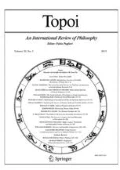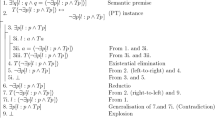Abstract
Philosophical semantics requires an ontology that includes negative as well as positive states of affairs as truth-makers and truth-breakers. Theories that try to do without negative states of affairs while interpreting propositional truth as positive correspondence with existent states of affairs are inherently inadequate and incomplete. A semantics and ontology of negative states of affairs can also do justice to positive states of affairs, since the iterated negative state of affairs that a negative state of affairs exists describes a positive state of affairs, but the iterated positive state of affairs that a positive state of affairs exists never describes a negative state of affairs. Negative states of affairs are not only essential to semantics, but to a complete description of the world; they include phenomena of presence in absence and the metaphysics of gaps, lacks, holes and interstitia. The conceivability of an empty or null universe as consisting of nothing but negative states of affairs recalls a famous problem of Parmenides.
Similar content being viewed by others
Notes
In lieu of listing out references to thinkers who have accepted an ontology of states of affairs as semantic truth-makers, I refer to a particularly articulate representative of this position in D. M. Armstrong, A World of States of Affairs (Cambridge: Cambridge University Press, 1997), especially pp. 13–14; 115–119; 128–135.
The trend is evident in Kevin Mulligan, Peter Simons and Barry Smith, ‘Truth-Makers’, Philosophy and Phenomenological Research, 44, 1984, pp. 287–321, where no provision for false sentences or the truth-breakers of false sentences is made. Notable exceptions include Bertrand Russell’s 1917–1918 ‘Lectures on Logical Atomism’, published as The Philosophy of Logical Atomism, edited by David Pears (LaSalle: Open Court Publishing, 1985), especially pp. 74–79. Russell, however, p. 79, declines in discussion at the lectures to offer a definition of ‘negative facts’, on the grounds that ‘negativeness is an ultimate’. See also Richard Gale, Negation and Non-Being, American Philosophical Quarterly Monographs, 10, 1976.
Ludwig Wittgenstein, Tractatus Logico-Philosophicus, edited by C·K. Ogden (London: Routledge & Kegan Paul Ltd., 1922), ‘1.11 The world is determined by the facts, and by these being all the facts. 1.12 For the totality of facts determines both what is the case, and also all that is not the case. 2.04 The totality of existent atomic facts is the world. 2.05 The totality of existent atomic facts also determines which atomic facts do not exist. 2.06 The existence and non-existence of atomic facts is the reality. (The existence of atomic facts we also call a positive fact, their non-existence a negative fact.)’
Purely for theoretical interest, it is worth noting that it is possible to advance a reductive account of truth-makers and truth-breakers for true and false affirmative and negative sentences. Whereas we cannot get by exclusively with positive states of affairs as truth-makers and truth-breakers, we can contrariwise meet the semantic obligations in question with only negative states of affairs. The reason for the asymmetry is clear when we reflect informally that two positives do not make a negative, but two negatives make a positive.
Theory 3 (Reduction):
Negative States of Affairs as Truth-Makers and Truth-Breakers
-
1.
Negative state of affairs as truth-maker for true affirmative sentence: The sentence, ‘The watch is on the table’, is made true if and only if the negative state of affairs in which it is not the case that the watch is on the table fails to exist.
-
2.
Negative state of affairs as truth-breaker for false negative sentence: The sentence, ‘The watch is not on the table’, is made false if and only if the negative state of affairs in which it is not the case that the watch is on the table exists.
-
3.
Negative state of affairs as truth-breaker for false affirmative sentence: The sentence, ‘The watch is on the table’, is made false if and only if the negative state of affairs in which it is not the case that the watch is on the table exists.
-
4.
Negative state of affairs as truth-maker for true negative sentence: The sentence, ‘The watch is not on the table’, is made true if and only if the negative state of affairs in which it is not the case that the watch is on the table exists.
The distinction is manifest among other ways in symbolic logic by the fact that all of the five standard propositional connectives can be reduced to any of the remaining three plus negation, even if combined in a single operator like the Sheffer stroke or Nicod dagger function, but that without negation, or at least predicate complementarity in the case of a Boolean algebra, there can be no adequate propositional logic.
-
1.
The same conclusion obviously holds with respect to nonclassical gap and higher-valued truth tables that transcend bivalence.
Jean-Paul Sartre, Being and Nothingness: An Essay on Phenomenological Ontology, translated and with an introduction by Hazel Barnes (New York: Philosophical Library, 1956), p. 9: ‘But if we wish to decide with certainty, we need only to consider an example of a negative judgment and to ask ourselves whether it causes non-being to appear at the heart of being or merely limits itself to determining a prior revelation. I have an appointment with Pierre at four o’clock. I arrive at the café a quarter of an hour late. Pierre is always punctual. Will he have waited for me? I look at the room, the patrons, and I say, “He is not here.” Is there an intuition of Pierre’s absence, or does negation indeed enter in only with judgment? At first it seems absurd to speak of intuition since to be exact there could not be an intuition of nothing and since the absence of Pierre is this nothing. Popular consciousness, however, bears witness to this intuition. Do we not say, for example, “I suddenly saw that he was not there.” Is this just a matter of misplacing the negation?’ See also pp. 9–16 and passim.
See Roberto Casati and Achille C. Varzi, Holes and Other Superficialities (Cambridge: The MIT Press (Bradford Books)).
David Hume considers the inconceivability of a total vacuum in A Treatise of Human Nature [1739–1740], edited by L.A. Selby-Bigge; second edition by P·H. Nidditch (Oxford: The Clarendon Press, 1978), pp. 55–59; 223. The argument is discussed in Dale Jacquette, “Hume on Infinite Divisibility and the Negative Idea of a Vacuum”, The British Journal for the History of Philosophy, 10, 2002, pp. 413–435.
The so-called problem of being, of why there is something rather than nothing, was posed first by G.W. Leibniz in his essay, ‘On the Ultimate Origination of Things’ (1697), in Leibniz: Philosophical Writings, edited by G.H.R. Parkinson, translated by Mary Morris and Parkinson (London: J.M. Dent & Son, 1973), pp. 136–144. More recently, the problem has been associated with the phenomenological ontology of Martin Heidegger and his obsession with ‘the question of being’. See Heidegger, An Introduction to Metaphysics (Lectures 1953), translated by Ralph Manheim (New York: Doubleday, 1961), pp. 1–42.
Plato’s Eleatic Stranger in his dialogue, the Sophist 237a-264b, offers this paradox. See Montgomery Furth, ‘Elements of Eleatic Ontology’, Journal of the History of Philosophy, 6, 1968, pp. 111–132. Francis Jeffry Pelletier, Parmenides, Plato and the Semantics of Non-Being (Chicago: University of Chicago Press, 1990).
A version of this essay was presented at the Society for Exact Philosophy, University of Toronto, Toronto, Canada, 19–22 May 2005, under the title ‘Negative States of Affairs’ as an invited lecture to the Vakgroep Theoretische Filosofie, Rijksuniversiteit Groningen, The Netherlands, 2 November 2005, and in revised form as ‘Logic and Semantics of False Predications’ at the Universität Salzburg, Austria, 18 May 2006. I recall with fondness the warm reception I enjoyed at Salzburg from my friends and critics, Edgar Morscher, Paul Weingartner, Alexander Heike, Arkadiusz Chrudzimski, and the graduate students and other attendees of my Oberseminar with Morscher on ‘Philosophische Logik’, 15–19 May 2006. Special thanks are due to Theo A.F. Kuipers and Erik W. Krabbe for thought-provoking comments at the Groningen colloquium. I am grateful to the Netherlands Institute for Advanced Study in the Humanities and Social Sciences (NIAS), Royal Netherlands Academy of Arts and Sciences (KNAW), for support of this and related topics in philosophical logic and philosophy of mathematics during my visit as Resident Research Fellow in 2005–2006. Later incarnations appeared under the title ‘On the Logic of Negation’, Department of Philosophy, University of Aberdeen, Scotland, 20 February 2007, and ‘Logic and Metaphysics of Negative States of Affairs’, presented to the Department of Philosophy, Bilkent University, Ankara, Turkey, 24 April 2007.
Author information
Authors and Affiliations
Corresponding author
Rights and permissions
About this article
Cite this article
Jacquette, D. Truth Breakers. Topoi 29, 153–163 (2010). https://doi.org/10.1007/s11245-009-9075-2
Published:
Issue Date:
DOI: https://doi.org/10.1007/s11245-009-9075-2




